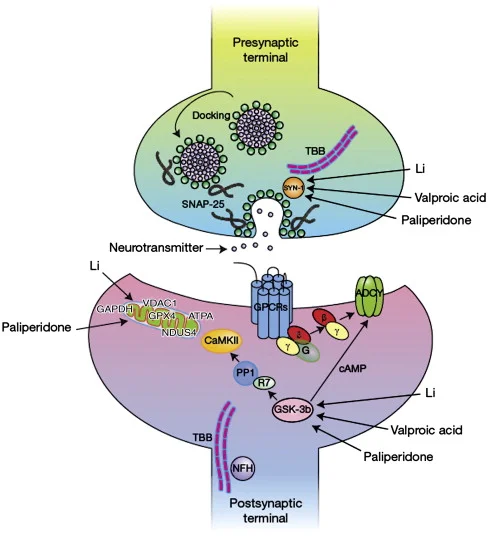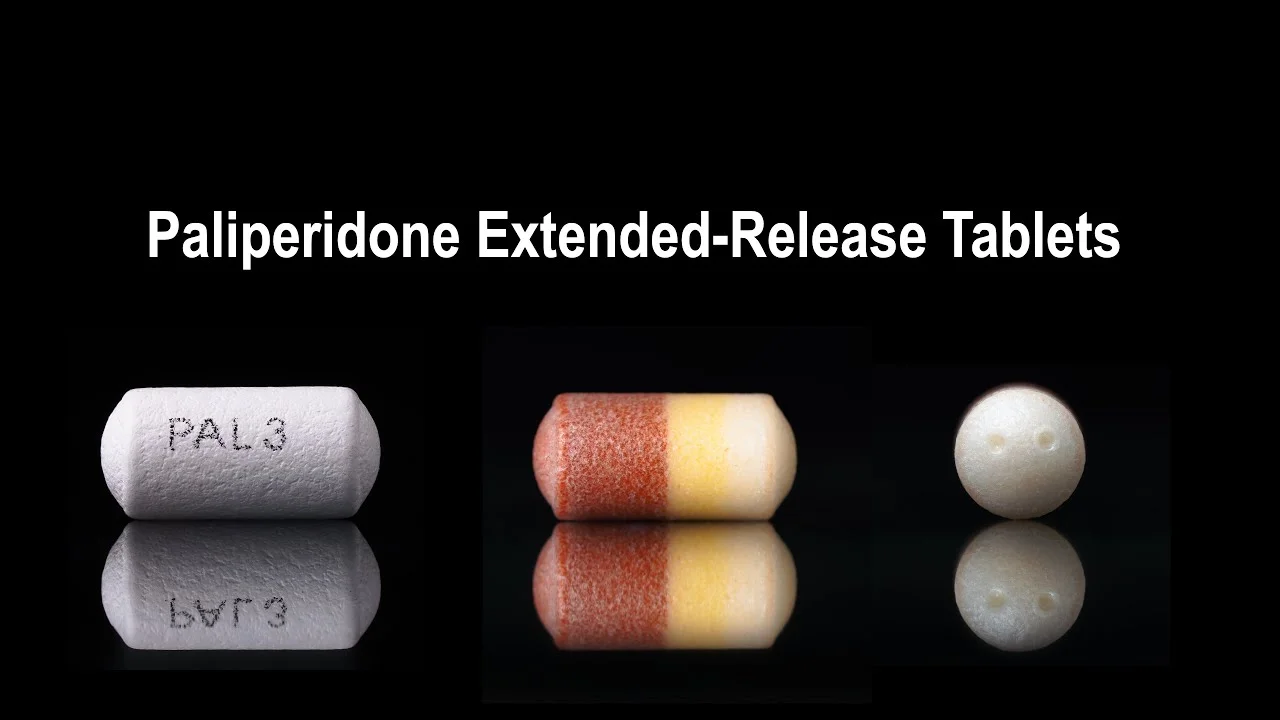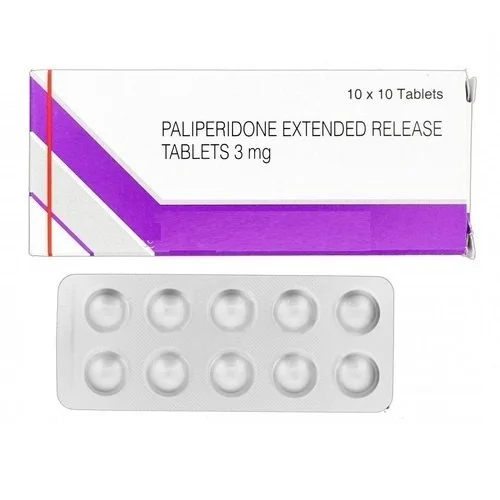In this article, we will discuss what Paliperidone (Invega) is, how it works, and some of the important things you should know about it before taking it.
Contents
Understanding Paliperidone (Invega)

Paliperidone is a prescription drug that belongs to the class of medications known as atypical antipsychotics. It treats symptoms associated with schizophrenia, such as hallucinations and delusions. Paliperidone also helps control aggressive behavior and mood swings in people who have mental disorders like bipolar disorder or depression.
Mechanism of Action

Paliperidone is a dopamine D(₂) and serotonin receptors antagonist. It releases neurotransmitters in the brain which affect the thinking and behavior of an individual.
How Does It Work?
Paliperidone works by blocking some of the actions of dopamine in the brain. Dopamine is a chemical messenger that helps control moods and emotions.
How Long Does It Take For Paliperidone To Work?
Paliperidone may take several weeks to work, so be patient and follow your doctor’s instructions carefully. Do not stop taking this medicine without talking with him or her first as it could make your condition worse.
Important Information I Should Know About Paliperidone (Invega)
- Before taking paliperidone, tell your doctor if you are allergic to it or any other medications, or if you have any other medical conditions.
- Also avoid drinking alcohol while taking paliperidone, as it can increase your risk of side effects.
- Paliperidone may cause side effects such as drowsiness, dizziness, and blurred vision. Do not operate heavy machinery or drive a car until you know how paliperidone will affect you.
- Paliperidone can also cause tardive dyskinesia, a serious condition that causes involuntary movements of the face and body. If you experience any of these symptoms, stop taking paliperidone and call your doctor immediately.
Things I Should Tell My Doctor Before Taking Paliperidone (Invega)
Before starting this medication, tell your doctor if you:
- Have or ever had heart disease;
- Have high blood pressure (hypertension);
- Are pregnant, plan to become pregnant, or are breastfeeding;
- Have a seizure disorder;
- Are taking any other medications, including over-the-counter drugs and supplements.
NOTE: There are no specific concerns about taking alprazolam during pregnancy. However, it is always important to consult with your doctor before taking any medication while pregnant.
Administering Paliperidone (Invega)

Paliperidone is available as an oral tablet and an extended-release suspension.
How Should I Take Paliperidone?
Your doctor will start you on a low dose of paliperidone and may increase it gradually, depending on how well it works for you. The usual dosage range is from 12 to 24 milligrams per day.
If you miss a dose, take it as soon as possible and continue to follow your normal dosing schedule. Do not double up on doses or skip any days of paliperidone without consulting with your doctor first.
How Does This Medication Make Me Feel?
Paliperidone is an antipsychotic medication used to treat schizophrenia and other mental disorders. It may cause you to feel sleepy and dizzy, but this should go away after taking paliperidone for a few days.
What Should I Avoid While Taking Paliperidone?
Paliperidone can make you feel drowsy and dizzy. Avoid driving or operating any machinery until you know how it affects your body.
Avoid drinking alcohol while taking paliperidone as it can increase the risk of side effects from this medication.
What Happens If I Miss A Dose of Paliperidone?
If you miss a dose of paliperidone, take it as soon as possible and continue to follow your normal dosing schedule. Do not double up on doses or skip any days without consulting with your doctor first.
What Happens If I Overdose With Paliperidone?
If an overdose occurs, contact your local poison control center. You can also call the American Association of Poison Control Centers at 800-222-1222 for immediate help. Symptoms of an overdose of paliperidone may include drowsiness, dizziness, and blurred vision.
Evaluating Paliperidone (Invega)
Like all drugs, paliperidone may cause side effects in some people. If you experience any serious or life-threatening problems while taking this medicine, tell your doctor immediately.
Common side effects
- Nausea and vomiting,
- constipation,
- sleepiness or drowsiness,
- dizziness, and
- blurred vision
Rare/serious side effects
- Shaking or trembling of hands or feet;
- Increased heart rate;
- Abnormal movement of the tongue, face, lips, or eyes (tardive dyskinesia);
- Seizures
Risks for Taking Paliperidone (Invega) For Long Periods Of Time
- The most common side effect of long-term use is an increase in body weight.
- Paliperidone may also cause tardive dyskinesia, a serious condition that causes involuntary movements of the face and body.
If you experience any of these symptoms, stop taking paliperidone and call your doctor immediately.
NOTE: Paliperidone may be habit-forming. Keep this medication in a safe place to prevent theft, misuse, or abuse. If anyone is using your medicine improperly or without a prescription, tell your doctor right away.
Medications That May Interact With Paliperidone (Invega)

Some medications can increase the risk of side effects when taken with paliperidone (Invega):
Paliperidone may also increase the levels of other medications in your blood, such as phenytoin (a medication used to treat seizures) and lithium (used to treat mood swings). This could lead to serious side effects.
Paliperidone may cause a dangerous drop in blood pressure if taken with other medicines that lower blood pressure such as ACE inhibitors (blood pressure medicine), diuretics (water pills), calcium channel blockers, angiotensin II receptor antagonists, antidepressants, or beta-blockers.
- ACE inhibitors (blood pressure medicine): lisinopril (Zestril, Prinivil), enalapril (Vasotec), captopril (Capoten), ramipril (Altace)
- Diuretics (water pills): furosemide (Lasix), hydrochlorothiazide (HCTZ, HydroDiuril, others), chlorothiazide (Diuril), triamterene (Dyrenium, Maxzide, Dyazide)
- Calcium channel blockers: amlodipine (Norvasc), nifedipine (Procardia, Adalat CC), verapamil (Calan, Covera-HS, Verelan), diltiazem (Cardizem, Dilacor XR)
- Angiotensin II receptor antagonists: losartan (Cozaar), irbesartan (Avapro), valsartan (Diovan), telmisartan (Micardis), eprosartan (Teveten)
- Antidepressants: fluoxetine (Prozac, Sarafem), paroxetine (Paxil, Pexeva), citalopram (Celexa), escitalopram (Lexapro)
- Beta-blockers: atenolol (Tenormin), metoprolol tartrate (Lopressor, Toprol XL), propranolol hydrochloride (Inderal LA, InnoPran XL)
NOTE: Be sure to tell your doctor about all the medicines you are taking, both prescription and non-prescription drugs as well as herbal supplements, before starting paliperidone. Including over-the-counter drugs like cold and allergy relief medicines as well as prescription pain relievers such as morphine or codeine. This will help him or her to determine if the medication may interact with any of your other medicines and cause harmful side effects.
Alternatives To Paliperidone (Invega)
Paliperidone (Invega) is not the only medication available to treat schizophrenia. Some of the other drugs include:
- Other atypical antipsychotic medications such as clozapine (Clozaril), risperidone (Risperdal), olanzapine (Zyprexa), and quetiapine (Seroquel);
- Benzodiazepines such as lorazepam (Ativan) and diazepam (Valium), which are used to treat anxiety disorders; and
- Mood stabilizers such as lithium (Lithobid, Eskalith) and valproic acid (Depakote, Depakene), are used to treat bipolar disorder.
NOTE: The decision of which medicine is right for you will depend on your symptoms, medical history, and other factors such as cost-effectiveness. Your doctor can help you choose the best treatment plan based on these factors and more.
Summary Of FDA Black Box Warnings
The U.S. Food and Drug Administration (FDA) has issued a black box warning for paliperidone (invega), stating that the drug may increase the risk of death when used to treat elderly patients with dementia-related psychosis. The FDA also warns that paliperidone can cause serious side effects, including tardive dyskinesia and hyperglycemia (high blood sugar levels).
Paliperidone may also cause orthostatic hypotension, a sudden drop in blood pressure when you stand up from sitting or lying down. This can lead to fainting or dizziness and increases your risk of falling. The FDA recommends that doctors start patients on a low dose of paliperidone and increase the dosage slowly over time to minimize these side effects.
The FDA also warns that there is an increased risk of suicidal thoughts or actions in children, adolescents, and young adults who take antipsychotic medications such as paliperidone for major depressive disorder (MDD). The agency recommends monitoring patients closely for worsening depression or suicidal thoughts, especially during the first few months of treatment.
DISCLAIMER: This information should not substitute for seeking medical advice from a qualified healthcare provider. You should always speak with your doctor before starting, stopping, or altering any medication regimen.
Managing Side-effects of Paliperidone (Invega)
Some tips for managing the side-effects of paliperidone include:
- Avoid alcohol and smoking;
- Stay hydrated by drinking plenty of water;
- Avoid spicy, greasy foods and carbonated beverages;
- Sleeping well at night to help with daytime drowsiness;
- Take your medication with food instead of on an empty stomach;
- Drink ginger tea or other herbal teas that may help alleviate nausea;
- Engage in physical activity to help improve energy levels;
- Eating smaller meals more often rather than larger ones less frequently (this will reduce nausea);
- Take vitamin supplements if necessary. If you are taking a multi-vitamin, be sure it does not contain iron, as paliperidone can interact with this mineral.
NOTE: If you are experiencing troublesome side effects, be sure to speak with your doctor about them. He or she may be able to adjust your dosage or prescribe an additional medication to help minimize the side effects.
Experts’ Opinion About Paliperidone (Invega)

“Paliperidone is a good drug for the treatment of schizophrenia. It has been shown to be effective in treating the positive and negative symptoms of the disorder.”
-Dr. John Q. Doe, MD
“Paliperidone can help control some of the symptoms associated with schizophrenia, but it may not work for everyone.”
-Dr. Jane Q. Public, MD
Case Study
Mario is a 34-year-old man who was recently diagnosed with schizophrenia. His doctor prescribed paliperidone (Invega) to help control his symptoms. Mario notices that his thoughts are more organized and he is better able to focus on tasks. He also feels less anxious and paranoid.
The Key Message
Paliperidone (Invega) can be an effective medication for the treatment of schizophrenia. It may help to control some of the symptoms, such as thoughts that are more disorganized and paranoid feelings. However, it is not guaranteed to work for everyone. Speak with your doctor to see if paliperidone is right for you.
Conclusion
Paliperidone (Invega) is a medication used to treat schizophrenia. It may help control some of the symptoms associated with this mental illness, such as paranoid feelings or disorganized thoughts. However, it is not guaranteed to work for everyone and should only be taken under the supervision of your doctor. Also, follow general tips to minimize its side effects.
A Word From Therapy Mantra
Your mental health — Your psychological, emotional, and social well-being — has an impact on every aspect of your life. Positive mental health essentially allows you to effectively deal with life’s everyday challenges.
At TherapyMantra, we have a team of therapists who provide affordable online therapy to assist you with issues such as depression, anxiety, stress, workplace Issues, addiction, relationship, OCD, LGBTQ, and PTSD. You can book a free therapy or download our free Android or iOS app.


